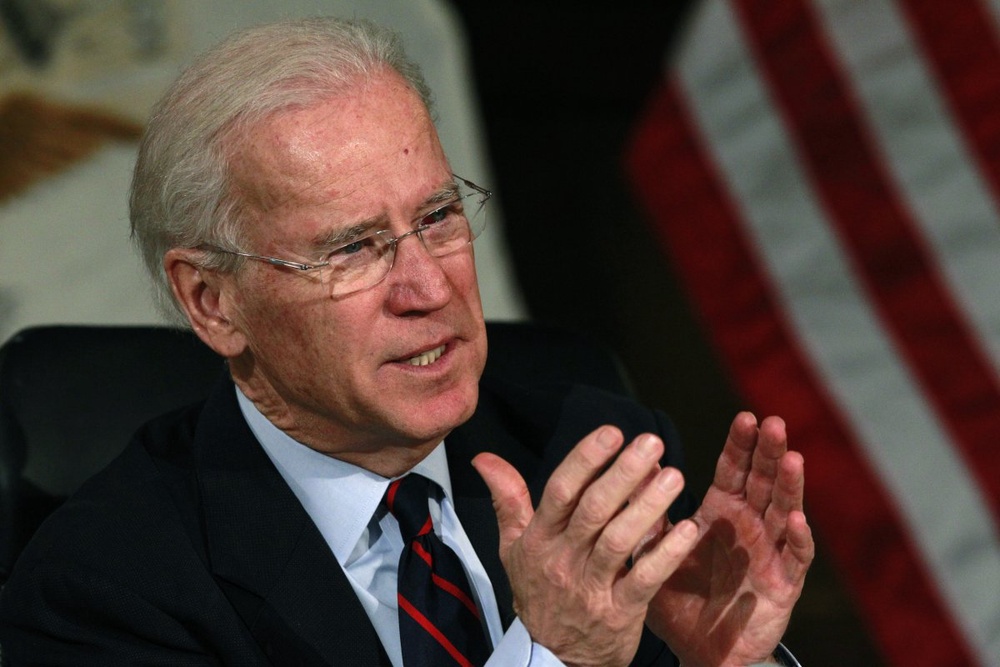
Vice President Joe Biden marched with black civil rights leaders Sunday in Selma, Alabama to commemorate the "Bloody Sunday" beating of voting rights marchers 48 years ago, AFP reports. The annual gathering took on added importance this year among civil liberties groups concerned with a voting rights case before the US Supreme Court. On Wednesday, the top court appeared ready to overturn, at least in part, the 1965 Voting Rights Act that guards against racial discrimination in US states with a segregationist past. State police assaulted the original 1965 marchers who were urging Congress to pass the law, which struck down rules that barred African Americans from voting and ended white majority rule in the US South. Remembering that day, Biden said his consciousness was shaped by television footage of the beatings by state troopers. "We still have a lot of work to do, but I think it will be easier, a lot easier than it was 48 years ago, for one overwhelming reason. What we all did here 48 years ago changed the hearts and the minds of the vast majority of the American people," Biden said. "That's why I'm absolutely convinced we will prevail in the new fight with regard to voter access and voter rights." Also at the event were John Lewis, who was beaten by state troopers armed with clubs and tear gas in 1965, and Terri Sewell, the first black woman to ever represent Alabama in Congress. Biden marched arm-in-arm with Sewell, a Selma native and a Democrat just re-elected to a second term. Together, the estimated 15,000 marchers, including civil rights activists and clergymen Jesse Jackson and Al Sharpton, sang "We Shall Overcome." At issue before the Supreme Court is the voting rights law's Section 5, which requires nine mainly southern states, and local governments in seven other states, to obtain Justice Department approval for any changes in their electoral codes. The case follows January's re-election of the first black US president, Barack Obama, which critics cite as evidence that the law is unnecessary.





Vice President Joe Biden marched with black civil rights leaders Sunday in Selma, Alabama to commemorate the "Bloody Sunday" beating of voting rights marchers 48 years ago, AFP reports.
The annual gathering took on added importance this year among civil liberties groups concerned with a voting rights case before the US Supreme Court.
On Wednesday, the top court appeared ready to overturn, at least in part, the 1965 Voting Rights Act that guards against racial discrimination in US states with a segregationist past.
State police assaulted the original 1965 marchers who were urging Congress to pass the law, which struck down rules that barred African Americans from voting and ended white majority rule in the US South.
Remembering that day, Biden said his consciousness was shaped by television footage of the beatings by state troopers.
"We still have a lot of work to do, but I think it will be easier, a lot easier than it was 48 years ago, for one overwhelming reason. What we all did here 48 years ago changed the hearts and the minds of the vast majority of the American people," Biden said.
"That's why I'm absolutely convinced we will prevail in the new fight with regard to voter access and voter rights."
Also at the event were John Lewis, who was beaten by state troopers armed with clubs and tear gas in 1965, and Terri Sewell, the first black woman to ever represent Alabama in Congress.
Biden marched arm-in-arm with Sewell, a Selma native and a Democrat just re-elected to a second term.
Together, the estimated 15,000 marchers, including civil rights activists and clergymen Jesse Jackson and Al Sharpton, sang "We Shall Overcome."
At issue before the Supreme Court is the voting rights law's Section 5, which requires nine mainly southern states, and local governments in seven other states, to obtain Justice Department approval for any changes in their electoral codes.
The case follows January's re-election of the first black US president, Barack Obama, which critics cite as evidence that the law is unnecessary.

 +7 (777) 001 44 99
+7 (777) 001 44 99















































